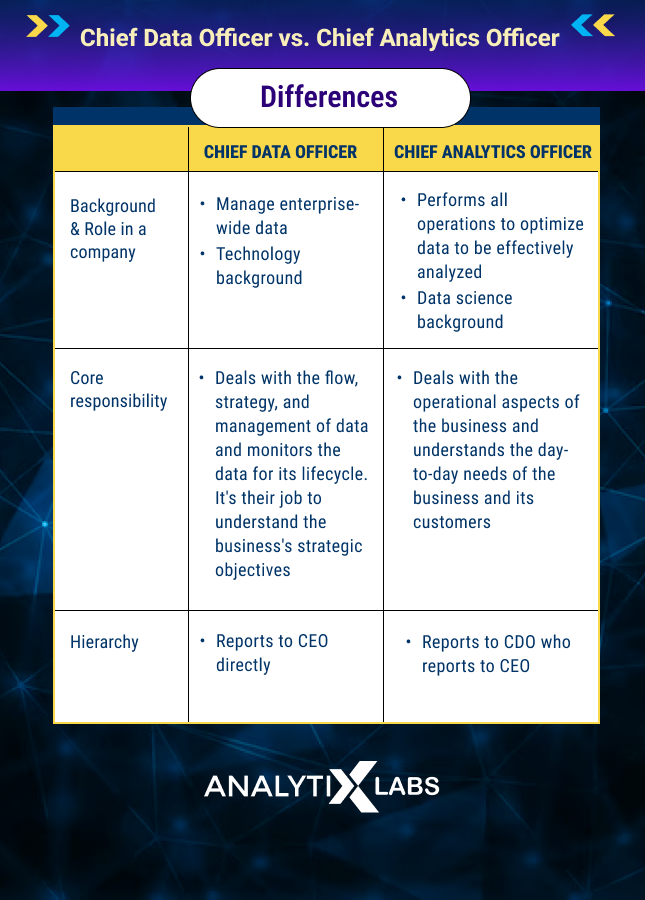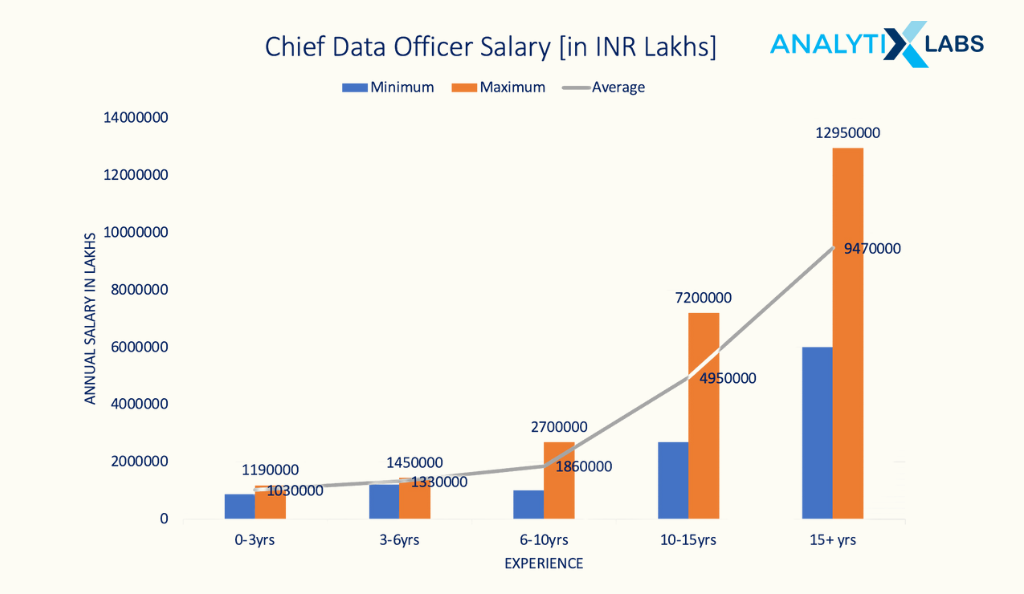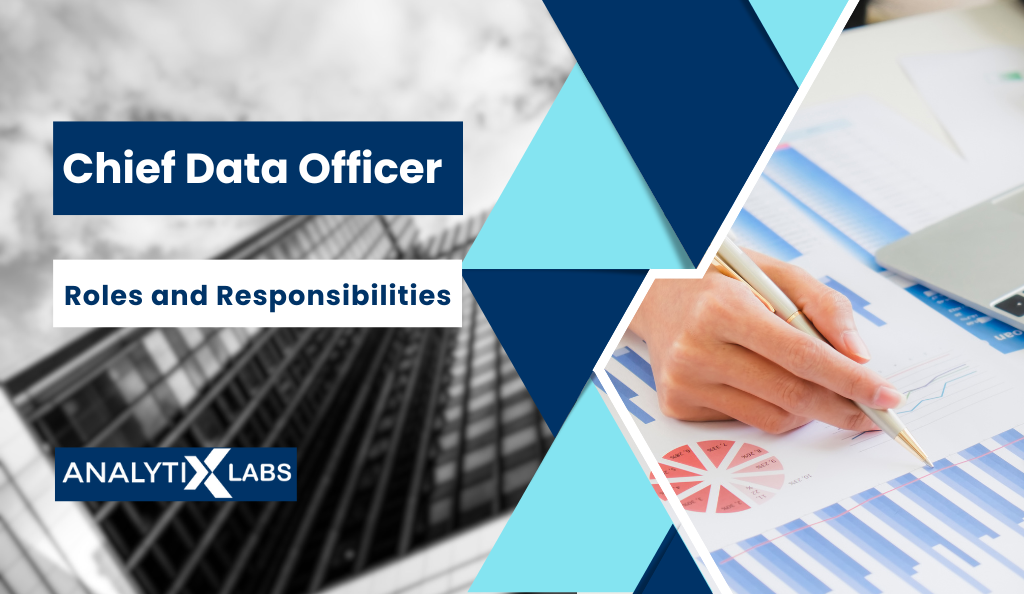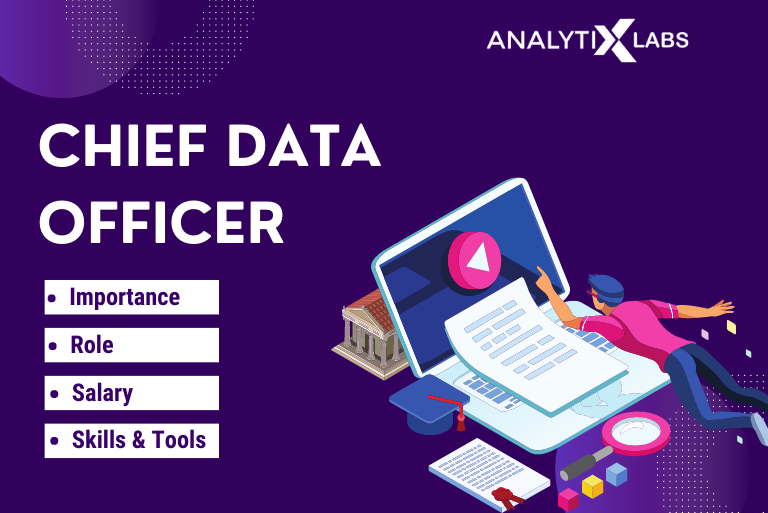In today’s data-driven world, the Chief Data Officer (CDO) has become the lifeblood of organizations across industries. To navigate this data-driven landscape, the roles and responsibilities of CDO take a key role in an organization’s development.
The roles and responsibilities of CDO extend beyond mere data management. They are critical in leveraging the vast information available to drive innovation and gain a competitive edge.
While for any company involved in dealing with data, roles like Chief Data Scientist and Chief Technology Officer are essential. This article discusses two important and less talked about C-level executives- Chief Data Officer and Chief Analytics Officer.
Who is a Chief Data Officer?
A common question asked by anyone getting familiarized with the structure of a company involved in data analytics is – What is a CDO? Chief Data Officer, commonly referred to as CDO, is a role that is on the rise in most companies. According to Gartner, 50% of all companies have CDOs post-2017.
The reason for this rise is the crucial role they play, as they are the ones who take care of the company’s enterprise-wide data. CDOs typically work in close contact with CIOs as the latter provides the means to collect, store and access data. And the former forms strategies based on the data, develop policy and explores new revenue streams.
The end aim of the CDO is to boost efficiency and productivity and find ways to better connect with customers and other stakeholders.Now let’s focus on the next type of C-level executive that deals with data and plays a crucial role in a company – the Chief Analytics Officer.
Who is a Chief Analytics Officer?
In almost all industries, from healthcare and media to financial services and manufacturing, the Chief Analytics Officer (CAO) role is becoming increasingly significant. CAO is responsible for analyzing the data.
The CAO’s job is to determine the apt methodology to analyze data, decide the tools to use, and how the resources will be allocated and used. To better understand what a CAO is all about, you need to understand that companies today deal with highly complex forms of data.
This complexity of data leads to various data-based operations. These include data management, governance, refinement, analytics, etc. Here, a company can appoint a C-level executive to perform each operation. It is in this context that a company employs a CAO.
A CAO performs all operations to optimize data to be effectively analyzed (and used in CRM), develop machine learning and AI models, create marketing engines, or any other data-intensive process.
Also, CAO is responsible for driving analytics initiatives in a firm. Constantly enhancing the analytics capabilities, infrastructure, and roadmap so that the leadership at large understands the importance of data.
If you have understood what a CAO does, then it’s no surprise if you are trying to distinguish between the job roles of CDO and CAO, which we will explore next.
CDO Vs. CAO
As you now have the answer to what is a CDO and CAO, understanding the differences and commonalities between them can now be easy. To comprehend the terms – CDO and CAO, you first need to know that there are three schools of thought here.
One school of thought is that these terms are the same, while the other thinks they are different and outlines their differences. The third one has a unique take that agrees with and differs from the previous two schools. Let’s discuss all these ideas.
-
No difference between CDO and CAO
Let’s start with the common aspects. Both job roles deal with data. That is why there is one school of thought that there is no difference between the two and that the terms can and should be used interchangeably. It’s this idea that companies like Gartner also do not create a distinction between CDO and CAO.
According to Andrew White, the research vice president at Gartner, the confusion is because of misunderstanding the term ‘analytics’. As per him, different organizations refer to analytics using various terms such as ‘knowledge management or ‘business intelligence’.
Different companies have different requirements, and because of it, a CAO can either perform the role of CDO or prepare analytical reports for various departments. Both job roles can easily mix up; based on the requirements, a CAO has to form new data management strategies.
As CAOs best understand the data, they can be roped into developing data-based strategies or provide suggestions. The ease of mixing up these job roles makes White conclude that, eventually, the title of CAO will be merged with CDO.
Also read: Business Intelligence vs. Business Analytics
-
Difference between CDO and CAO
However, another school of thought believes the two terms are inherently different and demand a clear distinction. The prime roles and responsibilities of CDO is to manage data and is more of a technology role, whereas CAOs have more to do with a data science background.
CDO deals with the flow, strategy, and management of data, and monitors the data for its lifecycle. It’s their job to understand the business’s strategic objectives. On the other hand, CAO deals with the operational aspects of the business and understands the day-to-day needs of the business and its customers.
Depending upon the size and type of the data and firm, CAO suggests the tools and strategies to analyze data. As per this school, the hierarchy is that the CAO reports to CDO, who in turn reports to the CEO.

-
Different but Same
The third school of thought agrees that the job roles are different as leading the data analytics operations and managing data are intrinsically two different things. However, this school believes that both functions belong to the same person.
As per Guy Gomis (who is a partner at BrainWorks – a recruiting company), typically, most leaders in the domain of analytics want to deal with data analytics and strategy by themselves. Combining both functions into a single job role makes more sense. Thus the difference between the two job roles mainly deals with transforming data into measurable insights.
You need to understand that the line between CAO and CDO is highly blurred as these positions are in a formative stage, with 72% of firms having unsettled roles relating to CDO and CAO (as per the 2020 NewVantage Partners Big Data and AI Executive Survey).
However, the idea you can take from the above discussion is that CDO seems to be a more prominent role. Therefore, its salaries, skills, and responsibilities are discussed ahead.
Chief Data Officer Salary
Given the unsettled nature of the job role, the salary of the chief data officer can vary a lot. However, as most companies hire CDOs from outside rather than within the organization, the salaries are relatively high.
As per ZipRecruiter, the average chief data officer salary is $177,000 in the US and typically ranges between $93,500 to $256,000, whereas the average, as per Glassdoor, is $146,000, which can go up to $375,000.As per salary.com, the median chief data officer salary in India is around 44 Lacs, ranging from 21 to 87 Lacs. Whereas Ambitionbox states that the average salary can be 40 Lacs.

Analyze the requirements of the companies that are providing such salary packages. You will find that they typically require work experience of 12 to 18 years and an extensive list of responsibilities and skillsets that we discuss next.
Chief Data Officer: Roles and Responsibilities

As discussed previously, CDO’s job roles and responsibilities are still pretty loose, and often the role of a CAO and similar executives can be combined. Therefore, the extensive list of all plausible responsibilities of a CDO is provided below.
- Governance: Monitoring, advising on, and governing the enterprise data.
- Operations: Enabling the operational readiness of the data by allowing its availability, usability, and efficiency.
- Innovation: Drive innovations in data management by identifying new strategies, tools, revenue streams, cost reduction mechanisms, etc.
- Analytics: Performing routine analytics on the products provided by the business, markets the business is involved in, and its customer base.
- Data Culture: Creating a culture where that way of thinking and practices are encouraged that requires the use of data.
- C-suite Collaboration: CDOs must work in close contact with other C-level executives such as the CEO, CFO, CTO, CIO, etc., understand their problems and needs, and work in the direction that helps solve their issues.
- Data Literacy: As a company can be dealing large volumes of data of varied kinds, CDOs must understand the numerous kinds of data being generated by the business.
- Data Protection: Ensure the data is free from corruption, intrusion, loss, etc. Also, regulatory compliances must be handled so that no data privacy breaches occur.
- Data Quality: Identifying ways to have data of the utmost quality and not consider this task an IT problem.
- Data Ethics: Promoting data ethics so that the data is used appropriately and not in a way that is unethical and can promote hate, misinformation, fake news, etc.
- Data Territorialism: Enabling the movement of data across different departments of the organization so that the shared data, metadata, and knowledge can be leveraged by all the concerned individuals, thereby eliminating data territoriality.
- Self-Service Data Analysis: While data territorialism is to be eliminated and bottlenecks in accessing data are removed, CDO also needs to ensure that the free flow of data is balanced and that the necessary mechanisms to safeguard sensitive data are put in place. The departments should know the data of interest and where to find it.
- Business Value: CDO is responsible for providing insights that enable business value increment and constantly asks crucial questions such as What does the data tell us? What value can be gained from the insights? How can routine decision-making be automated? etc.
- Data Warehousing: Given the enormous volume of data, identifying and incorporating modern data architectures, using data lake, and using the best data warehousing mechanisms.
- Data Trustworthiness: Assuring the data is trustworthy, can be used for decision-making, and is not dirty data. Here CDO needs to ensure that the data is devoid of duplicates, and if it’s marketing data, then the responses are valid.
- Data Maturity: Any organization involved in data needs to become mature in terms of its use. Reaching a high level of maturity is a long and arduous process that is to be led by the CDO.
As the firm becomes more mature in its data usage and management, the opportunities and business value gained from the data increase. Typically, the data maturity is evolved in the following stages-
- Record Keeping : The first stage for any firm is establishing the most basic form of data management, i.e., keeping a record of all business transactions, events, decisions, results, etc.
- Reporting : Create reports upon capturing the business transactions, events, decisions, and results. These reports can be for internal reference or external corporate compliance.
- Understanding what happened : Using retrospective and descriptive analysis, understand and quantify the business outcomes. This way, you know what happened and how much the outcome was.
- Understanding patterns : Create charts and perform hypothesis testing to identify correlations and connections between the various aspects of the business.
- Understanding cause and effect : Performing causal analysis on the data to understand why things happen and identify the ways to improve.
- Preparing for future : Involving predictive modeling and data analytics to understand what can happen in the future and forming strategies based on it.
- Organizational Learning : Involve machine learning and artificial intelligence to better adapt to the ever-evolving business landscape and automate decision-making to increase efficiency.
- Innovation : Use data to innovate so the business has an edge over the competitors.
As you can see, the roles and responsibilities of a CDO are many and quite intense. To properly execute these responsibilities, one requires specific skills discussed next.
Skills & Tools To Master
There are several skills that chief data officers need to possess to be able to execute their responsibilities discussed above successfully.
- Time Series Analysis: Important for predicting events that can happen to a business over a period of time.
- Supply Chain Management: is essential for companies involved in retail, logistics, etc.
Also read: Business Intelligence Value Chain: The Process to Make Powerful Business Decisions
- Python: The most commonly used language in the field of Data Science.
Also read: Learn about the best Python Libraries for ML
- Neural Networks: Important for employing AI-based solutions.
- Machine Learning: To develop predictive models dealing with large datasets.
- Kubernetes: Tool to automate software deployment
- Exploratory Data Analysis: Various methodologies to comprehend the data.
- Docker: To deliver software in the form of packages, helps in building, sharing, and running applications.
- Statistics: Good knowledge of descriptive and inferential statistics for hypothesis testing and predictive models.
- Data Security: Knowing about tools and techniques to secure enterprise data.
- Storytelling & Presentation Skills: Crucial for explaining the insights gained from the data to stakeholders that may not be well versed with the jargon of data science.
- New Trends and Products: Knowledge of new techniques to enable innovation in data management.
- Communication & Leadership: Being a C-level job, good communication and leadership skills are required so that the team under you can be well managed.
FAQs:
- What are a chief data officer’s responsibilities?
CDO’s key roles and responsibilities include managing data and ensuring the data is stored correctly and can be accessed by the concerned individuals.
- What skills are needed for a chief data officer?
A CDO typically needs to have good data science skills, including machine learning, deep learning, and statistics. He should also have a tremendous technological and IT understanding of the tools and techniques to store and access data efficiently.
- Which is higher, CIO or CDO?
As these job roles are new, the hierarchy between Chief Intelligence Officer and Chief Data Officer is largely unclear. CIOs are at the highest level in the IT department. CDOs can be a mix of data science and IT roles, often closely collaborating with the CIO.
I hope this article helped you understand the job role of CDO and CAO. If you have any doubts or queries, then write back to us.








